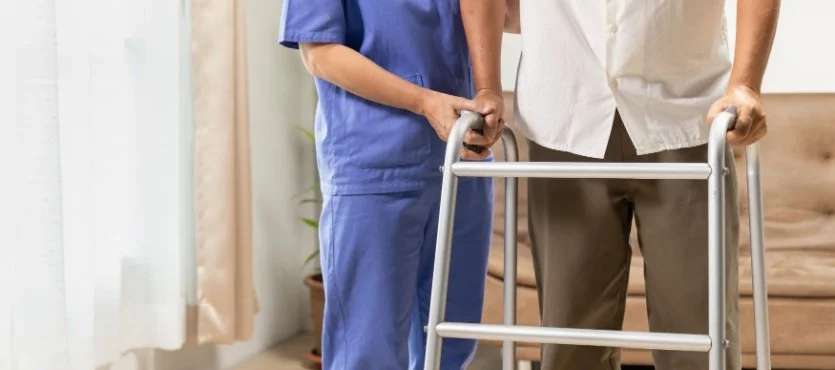HOME HEALTH SERVICES
Expert Recovery & Healing
-

Wound Treatment
Our comprehensive wound care combines thorough assessment, physician-directed treatments, and advanced infection prevention. Patients and caregivers receive personalized guidance, with ongoing coordination with physicians to adjust care and ensure optimal healing, comfort, and peace of mind.
-

Medication Management
We deliver personalized medication management, oversee complex regimens, IV and injectable therapies, and monitor effectiveness and side effects. Our team educates patients and coordinates closely with physicians and pharmacists to ensure safe, optimized care that supports recovery and well-being.
-

Disease Management
Immortelle Med provides proactive, personalized care for chronic conditions like diabetes, heart failure, COPD, and hypertension. We monitor key health metrics, intervene early to prevent complications, educate patients on self-management, and coordinate closely with specialists to optimize treatment plans.
-

Post-Operative Care
Immortelle Med provides attentive post-operative care, carefully monitoring surgical sites and overall recovery to identify potential complications early. Our team manages pain, supports mobility and activity guidelines, and ensures a seamless transition from hospital to home, coordinating follow-up care to promote safe, comfortable, and optimal healing.
Physical Therapy
-

Mobility and Fall Prevention
Comprehensive mobility and fall prevention support, including home safety assessments, personalized gait and balance training, and instruction in safe transfer techniques. Tailored fall prevention plans and emergency strategies help clients maintain independence, confidence, and safety in every environment.
-

Functional Fitness & Stability
Personalized strength and balance programs targeting key muscle groups to improve functional movement and overall stability. Progressive resistance and core exercises enhance posture, while functional movement training supports daily activities. Exercise intensity is carefully monitored and adjusted based on individual progress and tolerance.
-

Personalized Pain Care
Pain management using manual therapy, including soft tissue and joint mobilization, paired with therapeutic modalities such as heat, cold, and electrical stimulation. Education on body mechanics, posture, and ergonomics helps prevent discomfort during daily activities, while personalized self-management strategies support ongoing comfort and well-being.
-

Recovery & Rehabilitation
Post-surgery rehabilitation with phase-appropriate exercises tailored to orthopedic procedures, including joint replacements and fracture repairs. Focused on restoring range of motion, progressive strengthening, and functional task practice, all aligned with recovery timelines and coordinated closely with surgeons to ensure safe, effective outcomes.
Speech Therapy
-

Speech & Language Training
Speech and language training addressing articulation, fluency, and voice concerns. Programs include exercises to enhance verbal expression and auditory comprehension, alternative communication strategies when needed, respiratory support for improved speech, and progressive activities to build conversational skills and confidence.
-

Brain & Communication Rehabilitation
Cognitive-communication therapy designed to enhance attention, memory, and problem-solving following stroke or brain injury. Programs incorporate strategies for organization, planning, and sequencing, compensatory techniques for ongoing challenges, caregiver guidance, and environmental adaptations to support cognitive function at home.
-

Safe Swallowing & Nutrition
Swallowing disorder therapy with clinical assessment of function and aspiration risk. Includes targeted exercises to strengthen oral and pharyngeal muscles, compensatory techniques and positioning strategies, dietary modifications for safe swallowing, and patient and caregiver education to prevent and manage aspiration.
Occupational Therapy
-

Daily Living & Independence
Life skills training to support daily independence, including self-care assessments and guidance in bathing, dressing, grooming, and toileting. Programs also cover kitchen safety, meal preparation, energy conservation, and cognitive strategies for managing medications and household tasks.
-

Adaptive Techniques and Equipment
Personalized support with adaptive devices and techniques to enhance independence and safety. Includes hands-on training with assistive equipment for daily activities, guidance on home modifications for accessibility, strategies for optimal positioning and comfort, and connections to resources for acquiring necessary devices.
-

Dexterity & Functional Strength
Fine motor skill exercises designed to enhance hand strength, dexterity, and coordination. Programs include therapeutic activities for daily object manipulation, adaptations for handwriting and technology use, sensory retraining after nerve injury, and graded tasks to build endurance for sustained fine motor function.
Each of these services is delivered by licensed healthcare professionals who develop individualized care plans based on physician orders and patient-specific goals, with ongoing assessment and adjustment to maximize recovery and independence.
SERVICES PROVIDED BY IMMORTELLE MED HOME HEALTHCARE
LICENSE: 550008816

